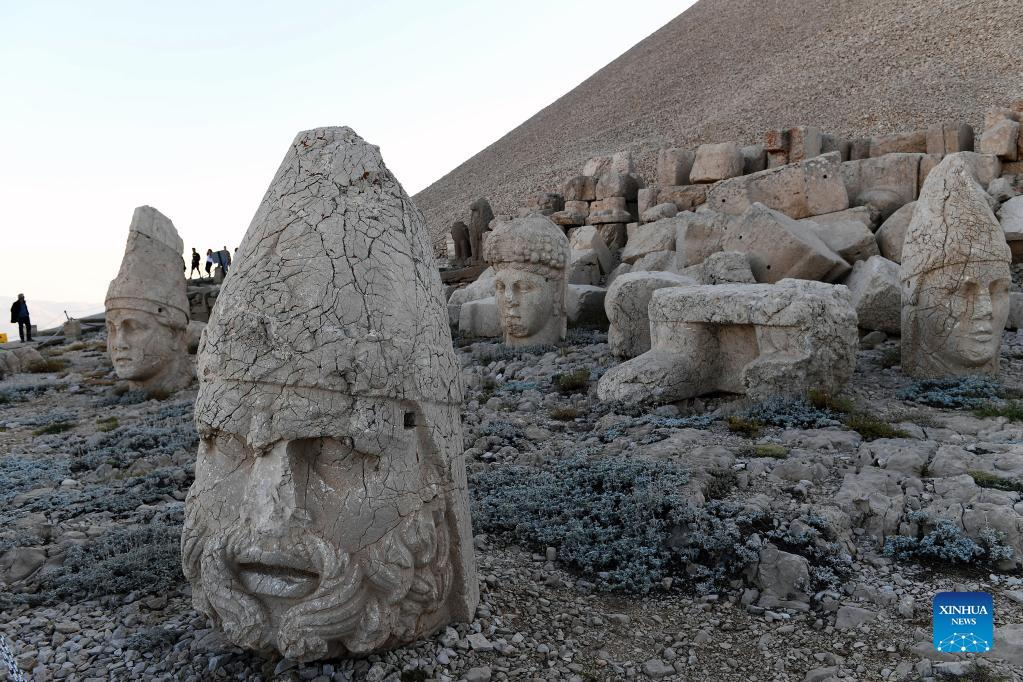
People visit the tomb-sanctuary on Mount Nemrut in Adiyaman Province, Turkey, on June 7, 2022. Mount Nemrut (Nemrut Dag) was inscribed on UNESCO World Heritage List in 1987. On Mount Nemrut, the mausoleum of Antiochus I, who reigned over Commagene, a kingdom founded north of Syria and the Euphrates after the breakup of Alexander's empire, is one of the most ambitious constructions of the Hellenistic period. The syncretism of its pantheon, and the lineage of its kings, which can be traced back through two sets of legends, Greek and Persian, is evidence of the dual origin of this kingdom's culture. (Photo by Mustafa Kaya/Xinhua)

People are silhouetted against the sunshine as they visit the tomb-sanctuary on Mount Nemrut in Adiyaman Province, Turkey, on June 7, 2022. Mount Nemrut (Nemrut Dag) was inscribed on UNESCO World Heritage List in 1987. On Mount Nemrut, the mausoleum of Antiochus I, who reigned over Commagene, a kingdom founded north of Syria and the Euphrates after the breakup of Alexander's empire, is one of the most ambitious constructions of the Hellenistic period. The syncretism of its pantheon, and the lineage of its kings, which can be traced back through two sets of legends, Greek and Persian, is evidence of the dual origin of this kingdom's culture. (Photo by Mustafa Kaya/Xinhua)

People visit the tomb-sanctuary on Mount Nemrut in Adiyaman Province, Turkey, on June 7, 2022. Mount Nemrut (Nemrut Dag) was inscribed on UNESCO World Heritage List in 1987. On Mount Nemrut, the mausoleum of Antiochus I, who reigned over Commagene, a kingdom founded north of Syria and the Euphrates after the breakup of Alexander's empire, is one of the most ambitious constructions of the Hellenistic period. The syncretism of its pantheon, and the lineage of its kings, which can be traced back through two sets of legends, Greek and Persian, is evidence of the dual origin of this kingdom's culture. (Photo by Mustafa Kaya/Xinhua)

People visit the tomb-sanctuary on Mount Nemrut in Adiyaman Province, Turkey, on June 7, 2022. Mount Nemrut (Nemrut Dag) was inscribed on UNESCO World Heritage List in 1987. On Mount Nemrut, the mausoleum of Antiochus I, who reigned over Commagene, a kingdom founded north of Syria and the Euphrates after the breakup of Alexander's empire, is one of the most ambitious constructions of the Hellenistic period. The syncretism of its pantheon, and the lineage of its kings, which can be traced back through two sets of legends, Greek and Persian, is evidence of the dual origin of this kingdom's culture. (Photo by Mustafa Kaya/Xinhua)

People visit the tomb-sanctuary on Mount Nemrut in Adiyaman Province, Turkey, on June 7, 2022. Mount Nemrut (Nemrut Dag) was inscribed on UNESCO World Heritage List in 1987. On Mount Nemrut, the mausoleum of Antiochus I, who reigned over Commagene, a kingdom founded north of Syria and the Euphrates after the breakup of Alexander's empire, is one of the most ambitious constructions of the Hellenistic period. The syncretism of its pantheon, and the lineage of its kings, which can be traced back through two sets of legends, Greek and Persian, is evidence of the dual origin of this kingdom's culture. (Photo by Mustafa Kaya/Xinhua)



